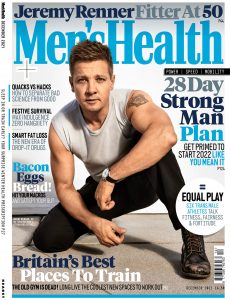
Men’s Health UK – December 2021
English | 142 pages | pdf | 92.37 MB
Welcome at Men’s Health UK Magazine December 2021 Issue
Back in June this year, many news outlets reported on the unprecedented decision to select a transgender athlete to compete at the 2020 Summer Games. Men’s Health was one of them. Following changes to rules set by the International Olympic Committee allowing trans women to compete as long as they met certain criteria, including testosterone levels being below a stipulated threshold, the selection of New Zealand’s Laurel Hubbard – a 43-year-old trans weightlifter – was a landmark moment. The BBC, by definition impartial (at least in theory), recorded it as ‘a controversial decision’.
In a short online piece, Men’s Health offered its take on the news story with assorted viewpoints, from fellow athletes to Olympic committee representatives to scientific studies. The issue was moot. It felt right to acknowledge it, albeit with caution and sensitivity.
A few days later, I was nonplussed to receive an email from a member of our parent company’s LGBTQ+ affinity group. We had a problem, I was told – an inclusivity problem.
Naturally, I reviewed the article, but again struggled to see the offence. Hadn’t we reported fairly, I asked? And after all, Laurel Hubbard had spent 34 years living as a man – didn’t that make it a male-interest story? As for inclusivity, aren’t we a fairly progressive title in the main? Haven’t we trailblazed the issue of male mental health, hadn’t we put an openly HIV positive gay guy on the cover, hadn’t we responded proactively and positively to the BLM movement?
To all these questions I received a succinct response that slowly made me realise quite how misguided and naive these assumptions were. Firstly, well-intentioned pieces on some subjects in no way mitigate a failure to lend the same kind of consideration to others. Secondly, Laurel Hubbard is a female athlete – if reporting on her was so unremarkable, where were all the other Men’s Health pieces on female athletes? And lastly, since we are so committed to the subject of mental health in multiple sectors of society, wouldn’t it be appropriate to acknowledge that the mental health of trans people is notably worse than the general population? Equal Play, this month’s feature profiling trans men involved in grass-roots sports and training, is the beginning of our response to these oversights. We purposely chose to look at amateur sport because it takes the conversation further away from the thorny arguments about competitive fairness on the world stage and retained differences in strength between trans and cisgender athletes. What we wanted to focus on was the transformative power of sport for the health of trans men.
From the rugby player to the martial artist to the boxer, each of the characters in our line-up attests to this potency. ‘When I was younger, going to the gym massively helped me conquer my gender dysphoria,’ says 30-year-old Jordan Jackson, a taekwondo fighter. ‘It was a fundamental part of my self-growth. I know how the mental health of trans people can deteriorate when they don’t have a physical outlet. My fitness and training have been a huge factor in my confidence.’
There will be some who find all this problematic; who think that the very subject of transgender athletes in competitive sport is at best controversial, at worst a triumph of woke fascism over sense, decency and logic.
There will doubtless be many who think that a magazine like Men’s Health should give the cultural politics a rest and stick to press-ups. At the time of writing, one of the top news stories concerns the resignation of Kathleen Stock, a philosophy professor at the University of Sussex, after alleged bullying and harassment following student protests against her views on gender identification and transgender rights. Commentary on both sides has become decidedly exclusive. It’s a dispiriting example of just how riven the issue has become.
Stock believes that biological sex is a fact of nature that cannot be annulled by claims of gender identity. She believes that same-sex facilities must be reserved for biological females on the grounds of safety and privacy. As an academic feminist, she believes that women have, throughout history, experienced oppression on the grounds of their biological sex, and that gender identity undermines this. Her opponents believe that they are standing up for a marginalised and victimised group. Ironically, this is precisely what Stock will feel she is doing, too.
Some of the language used on both sides of the argument has been strident to the point of aggression. Such polarisation is hardly helpful. My view – though I realise this may well invite its own criticism – is that if you believe in freedom of thought and speech, then it is not inconsistent to believe that biological sex is fundamental and that respect, compassion and equality should be afforded to anyone who identifies with a different gender to the one given to them at birth. Certainly, the men who had the guts to allow themselves to be photographed for our feature deserve respect. Admiration, too, for the way in which they have navigated their lives with bravery and integrity.
TOBY WISEMAN, EDITOR IN CHIEF
I hope that many will find inspiration in their stories.
Download from:
One Response to “Men’s Health UK – December 2021”